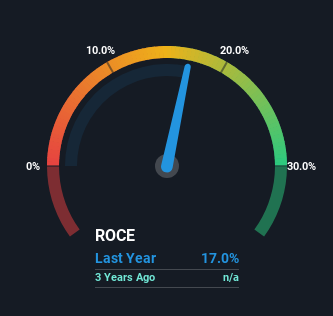These Return Metrics Don't Make Property Data Bank (TSE:4389) Look Too Strong
When researching a stock for investment, what can tell us that the company is in decline? More often than not, we'll see a declining return on capital employed (ROCE) and a declining amount of capital employed. This reveals that the company isn't compounding shareholder wealth because returns are falling and its net asset base is shrinking. So after we looked into Property Data Bank (TSE:4389), the trends above didn't look too great.
What Is Return On Capital Employed (ROCE)?
Just to clarify if you're unsure, ROCE is a metric for evaluating how much pre-tax income (in percentage terms) a company earns on the capital invested in its business. Analysts use this formula to calculate it for Property Data Bank:
Return on Capital Employed = Earnings Before Interest and Tax (EBIT) ÷ (Total Assets - Current Liabilities)
0.17 = JP¥602m ÷ (JP¥4.1b - JP¥565m) (Based on the trailing twelve months to June 2024).
Thus, Property Data Bank has an ROCE of 17%. That's a relatively normal return on capital, and it's around the 15% generated by the Software industry.
View our latest analysis for Property Data Bank

Historical performance is a great place to start when researching a stock so above you can see the gauge for Property Data Bank's ROCE against it's prior returns. If you'd like to look at how Property Data Bank has performed in the past in other metrics, you can view this free graph of Property Data Bank's past earnings, revenue and cash flow.
What Does the ROCE Trend For Property Data Bank Tell Us?
In terms of Property Data Bank's historical ROCE movements, the trend doesn't inspire confidence. Unfortunately the returns on capital have diminished from the 25% that they were earning one year ago. On top of that, it's worth noting that the amount of capital employed within the business has remained relatively steady. Since returns are falling and the business has the same amount of assets employed, this can suggest it's a mature business that hasn't had much growth in the last one year. If these trends continue, we wouldn't expect Property Data Bank to turn into a multi-bagger.
The Bottom Line
In the end, the trend of lower returns on the same amount of capital isn't typically an indication that we're looking at a growth stock. But investors must be expecting an improvement of sorts because over the last five yearsthe stock has delivered a respectable 67% return. Regardless, we don't feel too comfortable with the fundamentals so we'd be steering clear of this stock for now.
Since virtually every company faces some risks, it's worth knowing what they are, and we've spotted 3 warning signs for Property Data Bank (of which 1 is significant!) that you should know about.
While Property Data Bank may not currently earn the highest returns, we've compiled a list of companies that currently earn more than 25% return on equity. Check out this free list here.
New: Manage All Your Stock Portfolios in One Place
We've created the ultimate portfolio companion for stock investors, and it's free.
• Connect an unlimited number of Portfolios and see your total in one currency
• Be alerted to new Warning Signs or Risks via email or mobile
• Track the Fair Value of your stocks
Have feedback on this article? Concerned about the content? Get in touch with us directly. Alternatively, email editorial-team (at) simplywallst.com.
This article by Simply Wall St is general in nature. We provide commentary based on historical data and analyst forecasts only using an unbiased methodology and our articles are not intended to be financial advice. It does not constitute a recommendation to buy or sell any stock, and does not take account of your objectives, or your financial situation. We aim to bring you long-term focused analysis driven by fundamental data. Note that our analysis may not factor in the latest price-sensitive company announcements or qualitative material. Simply Wall St has no position in any stocks mentioned.
About TSE:4389
Flawless balance sheet and fair value.
Market Insights
Community Narratives


Recently Updated Narratives


MINISO's fair value is projected at 26.69 with an anticipated PE ratio shift of 20x


The Quiet Giant That Became AI’s Power Grid


Nova Ljubljanska Banka d.d will expect a 11.2% revenue boost driving future growth
Popular Narratives


The company that turned a verb into a global necessity and basically runs the modern internet, digital ads, smartphones, maps, and AI.


MicroVision will explode future revenue by 380.37% with a vision towards success



